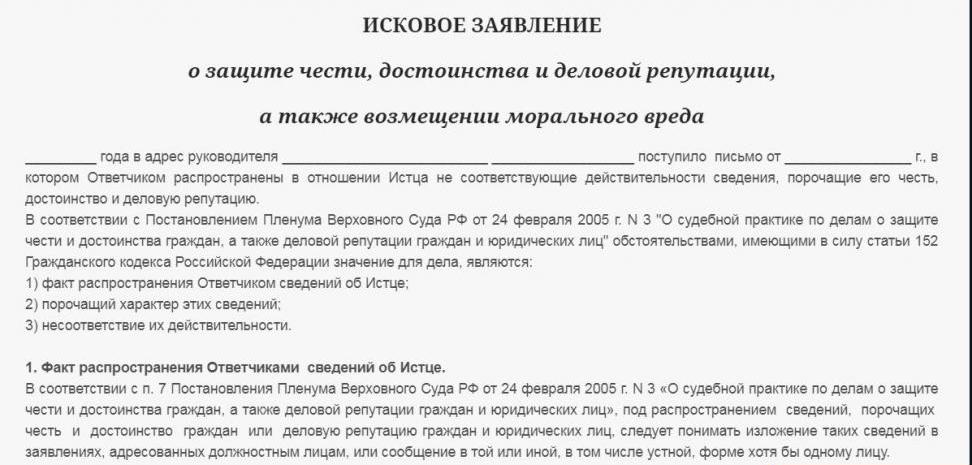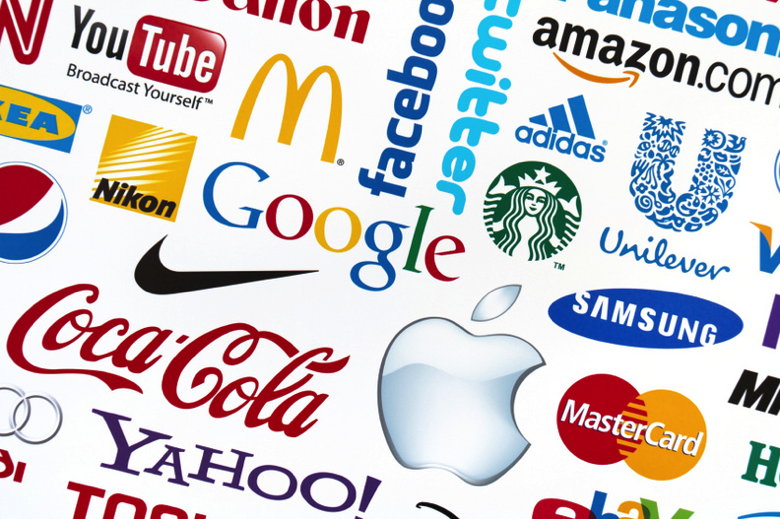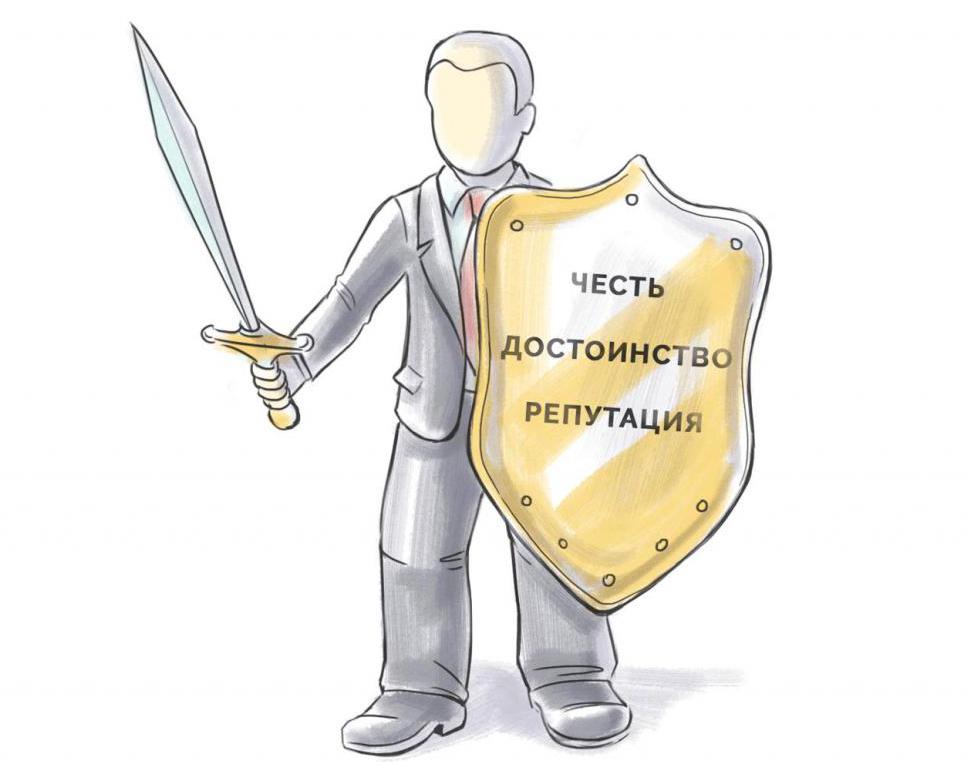The protection of the business reputation of a legal entity is not so new in Russian law, but there are still many questions to it. Simplifies the situation is the fact that cases are considered partly by arbitration courts. Their approach is usually considered more justified, and general courts are forced to equal arbitration.
The legislative framework
A whole list of articles in the Constitution mentions the right of citizens and organizations to personal dignity and reputation (Articles 21, 23, 34, 45 and 46). The Basic Law requires the use of the right to freedom of expression, acting reasonably and with discretion, and transfers such disputes to the competence of the court.

The Civil Code discloses the provisions of the Constitution on business reputation and the dignity of the individual and describes the means of protection and the mechanism for their application.
How to act is mentioned in the section on intangible goods, and in part in the section on compensation for harm.
As an explanation, we can refer to a number of decisions of the RF Armed Forces on moral harm, actually protecting the business reputation of organizations, application of the norms of the Constitution, etc.
Disputes about the violation of intangible goods are mentioned in other decisions of the Plenum, in particular on the application of the provisions of international treaties and the Basic Law of the country.
Periodically, regional level courts generalize the practice, its results are regularly published. Similar reviews were issued by the RF Armed Forces in 2007 and 2016.
Reference should be made to international treaties and acts affecting the right to protect business reputation.
The Convention on the Protection of Human Rights, which forms the basis of the ECHR, occupies a special position. Russian courts, in particular the Armed Forces of the Russian Federation, actively apply the acts of this court, adopted against the Russian Federation and other countries party to the Convention.
It is difficult to find a topic that is so widely discussed by representatives of the judicial system as protecting the honor and business reputation of a legal entity.
Legislative changes in 2013
The accumulated judicial practice has allowed amendments to the Civil Code to expand the possibilities of protecting the honor and business reputation of a legal entity. What are they?
- the court has the right to establish a violation of moral rights and publish its decision;
- if the refutation is not enough, the court has the right to oblige other persons to delete the relevant information;
- use as a measure of protection the seizure of tangible media with defamatory information, and its destruction without compensation to the owner of the media;
- prohibit the dissemination of any information that is not true, but not exclusively vicious.
Changes in the legislation have led to the fact that the protection of the business reputation of a legal entity is built on article 150 of the Civil Code. She lists the methods and ways of protecting business reputation.
Some features of the protection of legal entities
The practice of applying legislation in this area shows that, on the one hand, the business reputation of individuals and legal entities has the same status. But we must not forget about some of the nuances.
An organization's reputation may be transferred to the assignee as a result of a merger, division or reorganization. If the owner of the enterprise changes as a result of the transaction, goodwill passes along with all rights.

But this applies only to commercial organizations. Simply put, buyers value a product by remembering a brand or other designation that allows them to identify it with a particular manufacturer.So the case on protecting the business reputation of a legal entity can be initiated either by the successor or the new owner of the organization.
In general, the legislator maintains the unity of legislation regulating the status of citizens and organizations, eliminating the occurrence of unnecessary conflicts.
Reputation as an Intangible Good
The Civil Code mentions the dignity and business reputation of a person several times. The first time - in the part that equates the owners of this good: people and organizations, the second - in the provisions on simple partnership, the third - in paragraphs on the contract of commercial concession.
As a punishment for administrative violations, it is forbidden to choose measures that would somehow affect the way buyers and partners evaluate the goods and services of the punished organization.

One of the signs of unfair competition is the dissemination of defamatory, distorting reality or other information that negatively affects the assessment by third parties of the goods or services of a competing company.
No wonder the legislation calls part of the benefits intangible, they do not have an accurate monetary value, and it always remains approximate. Both the legislator and judicial practice actually recognize that a violation, in particular, of business reputation, cannot be fully compensated. As a result, the protection of the business reputation of a legal entity remains open. So how is reputation evaluated?
Assessment of infringement of rights in material terms
What are guided in terms of settlements, initiating cases on protecting the business reputation of a legal entity?
It is part of intangible assets according to the Accounting Rules as amended on December 27, 2007, order 153н. The assessment is based on the premium that the buyer is willing to pay when purchasing goods from a particular manufacturer.
The assessment also includes lost profits, those contracts that could be concluded. Information in connection with which it is submitted should have a direct impact on the entrepreneurial activity of the plaintiff. Just one statement that the actions of the defendant entailed losses is not enough.
Material circumstances
Judicial practice to protect the business reputation of a legal entity obliges the court to find out the following points:
- whether there was a fact of dissemination of information;
- whether these facts actually took place;
- whether the information was defamatory.
Information is considered to be widespread if it is published through the press, the Internet, by communication to officials of the authorities orally or in writing. This also includes statements in public, in front of a mass of people. Enough disclosure to even one person.
According to the second paragraph, it becomes clear whether the event took place, whether the plaintiff had any relation to it, and whether it occurred at the time indicated in the disputed information.
Information is considered defamatory if it alleges a violation of applicable law, in particular the rules of competition, business ethics, business practices and other actions that are negative in nature and that can affect reputation.
It should be noted that the dissemination of information that is not true, but not recognized as defamatory, may also be the subject of legal proceedings in accordance with the 2013 amendments. Otherwise, having mixed similar concepts due to misunderstanding, the plaintiff risks losing the case, which is justified.
What does not fall under defamatory and unreliable information
Judicial practice to protect the business reputation of a legal entity excludes the definition or statement of the following nature falling under the definition of defamatory information.
From the point of view of the law, the statements made by a specific person can be in the nature of a value judgment and represent exclusively a person’s personal opinion about the event.They cannot be checked for reality.
If, however, information is made about facts or events that have taken place, it cannot be taken as a value judgment.

So far, the courts have not been able to fully distinguish between where there is a statement of fact and where there is a judgment. Especially in cases whose participants are engaged in political activities.
Thus, having negative statements addressed to them, including with the use of profanity, the plaintiff runs the risk of the court accepting this information as a judgment. However, the fate of the lawsuit depends on the level of literacy of the position developed by the defendant’s representative lawyer and the explanations that the defendant will provide.
Slander border
The processes for protecting the business reputation of individuals and legal entities often involve defamation, which is an act that is subject to the articles of the Criminal Code.
What is the difference between them? Slander is a deliberate lie, and the person who is the distributor understood that it was actually not true.
In practice, it is almost never possible to prove slander, that is, a deliberate, deliberate lie, which is why a lot of cases of this kind are considered in the framework of civil and arbitration proceedings.
Moral injury
Since the 90s, the question has been raised how the protection of the business reputation of a legal entity and moral harm are combined. For a long time, the courts could not fully formulate their opinion on this matter.
In 2013, in the art. 152 of the Civil Code have been amended. In particular, the last paragraph of the designated article makes a reservation that measures aimed at protecting honor and dignity also apply to organizations. An exception has been established in respect of non-pecuniary damage.

Why is that? Non-pecuniary damage is the suffering and experience of a person in connection with the unlawful actions of the defendant. In addition, the law gives the organization the right to recover damages, which the average citizen cannot count on.
By this, those who wish to protect the business reputation of a legal entity from defamation (spreading lies) are not infringed, but are equated with citizens in remedies. How correct the position is, the other question, the more the ECHR has repeatedly referred to the organization’s compensation for non-material damage.
Claim Structure
The claim is made in accordance with the requirements of the procedural legislation. There is some difference between the applications to the arbitration court and the general court. A model legal entity business reputation lawsuit is usually designed to make this difference.
The document is prepared as follows:
- name of court;
- information about the plaintiff (full name of the organization and location according to constituent documents and entries in the Unified State Register of Legal Entities, as well as full name and actual address of residence);
- similar information about the defendant (the author of the material, or its distributor, or both);
- similar information about a third party (the one whose rights are still affected by the lawsuit, for example, the employee who disseminated information using his official position);
- circumstances that led to a lawsuit (all three of the above components);
- norms on legislation, links to explanations of the RF Armed Forces and the Resolution of the Plenums
- arguments and references to evidence confirming the position of the plaintiff;
- requirements (what exactly does the plaintiff ask the court to protect his rights);
- a list of attached documents or evidence of their direction to the defendant along with a copy of the claim, if the materials are submitted to the arbitration court;
- Signature and filing date of the claim.
The limitation period for applying to the court is 12 months from the date of publication of the materials.
If a representative acts by proxy, a copy is attached. Attached is a copy of the document confirming the authority of the official who signed the lawsuit or power of attorney for representation.
The practice of appealing to the courts indicates that samples are sometimes not enough to prepare a lawsuit to protect the business reputation of a legal entity. It is advisable to attract a specialist who has experience in a similar field.
Which court is suing
Claims for the protection of the business reputation of a legal entity are considered by the courts of both general jurisdiction and arbitration. How are the competencies of the courts distinguished?
If the information disputed by the entrepreneur or commercial organization does not relate to entrepreneurial activity, the case shall be considered by the district court in the first instance.
So, for example, the situation is with lawyers, whose activities under the law are not considered entrepreneurship. This includes organizations or legal entities that are not engaged in entrepreneurship.

A commercial activity or entrepreneurship is the provision of services or the sale of goods in order to distribute profits between participants or founders of an organization. If such an activity takes place, but its result is aimed at providing activity, for example, payment of utilities, rent, the organization cannot be assigned the status of a merchant.
Claims for the reputation of authorities or institutions performing public functions, in particular the RF PF, the MFC, etc., are not accepted by the courts. The motivation is that such persons perform administrative and managerial functions.
If the dispute does not affect the economic activity of the plaintiff, but rather is regulated rather by labor legislation, it should be examined in a general court.
If information is disseminated about the quality of goods and services, violations of business ethics (all that was mentioned above about unfair competition) - then a statement on the protection of the business reputation of a legal entity falls within the competence of arbitration justice.
Applicable evidence
Video materials, newspaper issues may not be stored in archives, and the plaintiff has the right to present any evidence supporting the claim. For example, testimonies of witnesses who watched the broadcast, copies of broadcasts or materials posted on the Internet. This includes the program guide or other channel messages about the time of release of the corresponding material.
In this case, in the case on protecting the business reputation of a legal entity, the court will accept as evidence a certificate from the organization that monitors the media. It will serve as a confirmation of the fact of the release of the program and its content.

In addition, plaintiffs use the services of notaries that record the fact that information is located on a page on the Internet in preparation for a lawsuit so that the holder does not have time to delete the information.
In the arbitration process, circumstances confirmed during the exercise by the notary of his authority do not need additional confirmation. In the CCP there is no similar provision.
How proof is built
The general rule states that each party is obliged to prove the circumstances to which it refers. The described category of cases provides for some exceptions, in particular, the defendant is obliged to prove the validity of the information disseminated by him.
As indicated above, an assessment of the circumstances of the case is given on three points:
- distribution fact;
- information is not true;
- information is defamatory.
In its review, the RF Armed Forces refers to the need for expertise. It is assigned to identify the significance of the effect of the distribution of actions by the defendant, to identify plagiarism on the part of the plaintiff and whether the statements are defamatory.
If no assessment is given on the above points or an examination has not been carried out, the risk of canceling decisions increases significantly.
Difficulty proving
Firstly, it is difficult to prove the connection between the damage and the actions of the defendant.Economic activity is, in principle, risk-based, and it is difficult to tie down a fall in stocks or termination of contracts or buyers' refusal to purchase goods or use services with the dissemination of defamatory information.
It is difficult to calculate and prove the real damage, but it is even more difficult to justify the lost profit - the money that the company could receive if it were not for the actions of the defendant.
It should be noted that the protection of the business reputation of a legal entity from a citizen is built according to the same rules and does not have any specifics.
In conclusion - on claims
Protection of the business reputation of a legal entity provides a wide range of ways to influence the defendant. The law provides for the following options:
- the imposition of an obligation by the court to disseminate the refutation in the same way that the original information was disseminated;
- the denial of information through the media should be done in the press that disseminated the information;
- a document issued by the organization is subject to cancellation or a new document with refutations is issued in return;
- oblige the perpetrators to delete the information and (or) oblige the suppression of its further dissemination, as well as oblige the authorities to seize the material carriers of such information and destroy it without compensation to the owner;
- if the information is distributed on the Internet, the plaintiff has the right to demand the removal of information and the distribution of a refutation in a manner that would facilitate its distribution;
- allowed to ask the court to establish the fact that the information does not match reality.
The plaintiff must choose one or more methods that are optimal for his circumstances and most adequately protect the business reputation of the legal entity.
